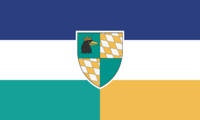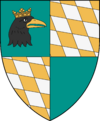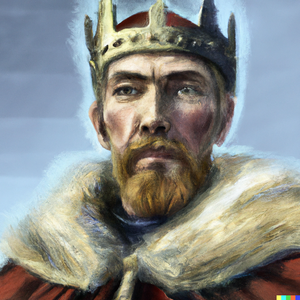Kisanaq: Difference between revisions
mNo edit summary |
|||
| Line 63: | Line 63: | ||
== History == | == History == | ||
===Nbuka Realm=== | ===Nbuka Realm=== | ||
| Line 73: | Line 72: | ||
===First Kingdom=== | ===First Kingdom=== | ||
After the dissolution of the Nbuka Realm of 1497, the Duchy of Kisanaq formally transformed into a Kingdom, later called the First Kingdom of Kisanaq. Continuing in the expeditions into the northern seas, the First Kingdom gained the nickname of 'Athenian viking state' amongst todays historians. Some sources state that the Naquese expeditions explored and raided lands as far as today's New Tribia, | After the dissolution of the Nbuka Realm of 1497, the Duchy of Kisanaq formally transformed into a Kingdom, later called the First Kingdom of Kisanaq. Continuing in the expeditions into the northern seas, the First Kingdom gained the nickname of 'Athenian viking state' amongst todays historians. Some sources state that the Naquese expeditions explored and raided lands as far as today's New Tribia, but there isn't any hard proof behing these claims. | ||
Kisanaq became a prominent player in northern Athenian trade after the discovery of large gold deposits on the Taraq Isle in 1420. It has built strong trade ties with | Kisanaq became a prominent player in northern Athenian trade after the discovery of large gold deposits on the Taraq Isle in 1420. It has built strong trade ties with many of the former Nbukan duchies and grand duchies, especially with the former Nbukan capital of Nbi and its partnered duchies, securing its access to many agricultural products which were very hard to obtain on the cold northern peninsula. | ||
Its only neighbour, now the Grand Duchy of the Northern Lands, naturally became interested in the Taraq gold deposits and on the 21st of December 1425 invaded the Kingdom. The Nbi Kingdom, whose relations with the Northern Lands were, after the dissolution of the Nbuka Realm, at an all time low, joined the war on Kisanaq's side shortly after. The war, which lasted for 5 years, resulted in the puppeting of the Northern Lands by Nbi Kingdom and the forming of an alliance between Kisanaq and Nbi. The famous 'Fortress Line', a line of military fortresses on the Naquese border, which sets the borders of even the modern day Kisanaq, was built either during or shortly after the war. | Its only neighbour, now the Grand Duchy of the Northern Lands, naturally became interested in the Taraq gold deposits and on the 21st of December 1425 invaded the Kingdom. The Nbi Kingdom, whose relations with the Northern Lands were, after the dissolution of the Nbuka Realm, at an all time low, joined the war on Kisanaq's side shortly after. The war, which lasted for 5 years, resulted in the puppeting of the Northern Lands by Nbi Kingdom and the forming of an alliance between Kisanaq and Nbi. The famous 'Fortress Line', a line of military fortresses on the Naquese border, which sets the borders of even the modern day Kisanaq, was built either during or shortly after the war. | ||
| Line 88: | Line 87: | ||
Kisanaq is a unitary constitutional monarchy with a parliamentary system of government, wherein the Emperor of Kisanaq is the head of state and the prime minister is the head of government. | Kisanaq is a unitary constitutional monarchy with a parliamentary system of government, wherein the Emperor of Kisanaq is the head of state and the prime minister is the head of government. | ||
The Government's exercise of executive power derives from the Constitution. The members of the government are the Prime Minister, Deputy prime ministers and other ministers. The Government is responsible to the Chamber of Deputies. The Prime Minister is the head of government and wields powers such as the right to set the agenda for most foreign and domestic policy and choose government ministers. | |||
===Head of state === | ===Head of state === | ||
The Emperor is a formal head of state with limited and specific powers, who appoints the prime minister, as well the other members of the cabinet on a proposal by the prime minister. | |||
The current serving head of state is Emperor Ataraq II. Ki Maqi, the eldest son of Adila IV. Ki Maqi, the former Naquese Emperor, and Kata VII. Ka Lakaraq, the Princess of Giha. In 2020, Ataraq's net worth was estimated around US$4 billion. | The current serving head of state is Emperor Ataraq II. Ki Maqi, the eldest son of Adila IV. Ki Maqi, the former Naquese Emperor, and Kata VII. Ka Lakaraq, the Princess of Giha. In 2020, Ataraq's net worth was estimated around US$4 billion. | ||
===Federal subdivisions === | ===Federal subdivisions === | ||
| Line 106: | Line 107: | ||
| value1 =94.9 | | value1 =94.9 | ||
| color1 =LightYellow | | color1 =LightYellow | ||
| label2 = | | label2 =Decembrian | ||
| value2 =1.4 | | value2 =1.4 | ||
| color2 =DarkCyan | | color2 =DarkCyan | ||
| Line 159: | Line 160: | ||
==Culture and Society == | ==Culture and Society == | ||
===Education=== | ===Education=== | ||
Despite its small size, North Peninsula is home to a highly educated and skilled workforce. The country's education system is among the best in the world, with a focus on science, technology, engineering, and mathematics. This has helped to create a strong knowledge-based economy, with many of the country's businesses involved in cutting-edge research and development. | |||
===Attitudes and worldview === | ===Attitudes and worldview === | ||
===Cuisine=== | ===Cuisine=== | ||
| Line 166: | Line 168: | ||
==Economy and Infrastructure== | ==Economy and Infrastructure== | ||
The Naquese economy is regarded as free, innovative, dynamic and business-friendly. For several years, Kisanaq has been one of the few countries with an AAA credit rating from the big three. It ranks as one of the world's most competitive economies in 2022, according to the World Economic Forum's ranking. It is based largely on the financial sector. The country is home to a large number of banks, insurance companies, and other financial institutions, which take advantage of the low tax rates to conduct their business. Kisanaq is also a popular destination for offshore banking and wealth management, with many high-net-worth individuals and corporations choosing to keep their assets in the country. | |||
=== Currency=== | === Currency=== | ||
Kisanaq Anatak | Kisanaq Anatak | ||
===Healthcare=== | ===Healthcare=== | ||
The government provides free or low-cost access to a range of healthcare services, including primary care, specialized care, and hospital care. The country also has a well-developed network of community health centers, which provide services such as immunizations, health screenings, and chronic disease management. | |||
In addition to its public healthcare system, Kisanaq also has a thriving private healthcare sector. The country is home to a number of world-class hospitals and medical centers, which are equipped with the latest technology and staffed by highly trained doctors and nurses. Many North Peninsula residents choose to use private healthcare services, as they offer faster access to care and a wider range of treatment options. | |||
===Transportation=== | ===Transportation=== | ||
The Republic of North Peninsula has an advanced transportation system. The Naquese high-speed rail network is operated by the state-owned company Naquese Railways. The company operates a fleet of modern trains, which are capable of reaching speeds of up to 300 km/h. These trains are equipped with comfortable seating, Wi-Fi, and other amenities, making them a popular choice for both business and leisure travelers. | |||
In addition to its high-speed rail network, North Peninsula also has a well-developed road and air transportation system. The country has a network of modern highways, which connect Kisanaq City with the rest of the country. Kisanaq also has several international airports, which provide access to destinations around the world. | |||
Overall, the transportation system in North Peninsula is efficient and convenient. The focus on high-speed rail has helped to reduce travel times and improve connectivity within the country, while the well-developed road and air transportation networks provide additional options for travelers. | |||
===Energy=== | ===Energy=== | ||
===Technology=== | ===Technology=== | ||
Revision as of 20:15, 15 December 2022
This article is incomplete because it is pending further input from participants, or it is a work-in-progress by one author. Please comment on this article's talk page to share your input, comments and questions. Note: To contribute to this article, you may need to seek help from the author(s) of this page. |
The Naquese Crown State Kisanaqa Tanala Hata (Naquese) | |
|---|---|
| Motto: God, Nation, Emperor | |
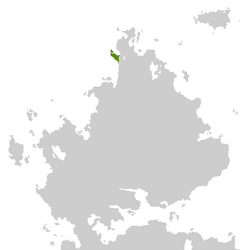 Location Kisanaq (green) in upper Athenia | |
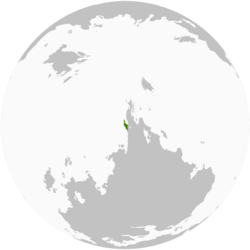 Location of Kisanaq (green) on the globe (green) | |
| Capital | Kisanaq City |
| Official languages | Kisanaq |
| Religion | Misakate |
| Demonym(s) | Kisanaq (noun) Kisanaq (adjective) |
| Government | Unitary parliamentary constitutional monarchy |
• Emperor | Ataraq Ki Maqi |
• Prime Minister | Adila Ki Faran |
| Population | |
• Estimate | 8,678,833 |
| GDP (nominal) | estimate |
• Total | |
• Per capita | |
| HDI | 0.978 very high |
| Currency | Kisanaq Anatak (KIA) |
| Driving side | right |
| Calling code | +101 |
Kisanaq, officially the Kingdom of Kisanaq Crown, is a country in northern Athenia, occupying the small Kisanaq Peninsula and the nearby Taraq Isle. Kisanaq is a constitutional monarchy and a developed country with an advanced high income market economy. Its capital and largest city, the Kisanaq City, serves as a financial centre of north Athenia and hosts the headquarters of many multinational corporations.
The country originates from the remote town of the Nbuka Realm, Kisanaq, which became home to the house of Rasmuq in 1203. In 1424, the house gathered enough resources and power to make the whole peninsula an autonomous region. The country, which at that time only contained the city and forests surrounding it, then gained full independence in 1497, after the collapse of the Nbuka Realm. Kisanaq was later colonized by December in the 19th century and regained its independence in 1954.
History
Nbuka Realm
Kisanaq was first mentioned as a castle in 976. A base for further Nbukan expeditions into the wilderness of northern Athenia, it became a town in 1098 when King Farita III. granted Kisanaq its civic charter as a "Royal Special Town". In the 1100s, it had a population of roughly a thousand people.
In 1203, Adili of the house of Rasmuq made a deal with the Duke of the Northern Lands Misata Ki Afatikaq and had a castle of his own by the name of Pataqi built northwest of the town, where he later moved with his wife Taqiha Ka Masapi and 2 sons. What followed were years of heavy investments into the town and its infrastructure, which resulted in the influx of peasants and the growth of the mostly fishing and hunting-based economy. In 1225, the coastal town was chosen to become the base for Nbukan northern sea expeditions. Kisanaq was given the status of a duchy in 1237, with the whole peninsula falling under Duke Adili Ki Rasmuq's rule, splitting away from the Nbukan province of the Northern Lands, ruled by Duke Paqa Ki Afatikaq.
First Kingdom
After the dissolution of the Nbuka Realm of 1497, the Duchy of Kisanaq formally transformed into a Kingdom, later called the First Kingdom of Kisanaq. Continuing in the expeditions into the northern seas, the First Kingdom gained the nickname of 'Athenian viking state' amongst todays historians. Some sources state that the Naquese expeditions explored and raided lands as far as today's New Tribia, but there isn't any hard proof behing these claims.
Kisanaq became a prominent player in northern Athenian trade after the discovery of large gold deposits on the Taraq Isle in 1420. It has built strong trade ties with many of the former Nbukan duchies and grand duchies, especially with the former Nbukan capital of Nbi and its partnered duchies, securing its access to many agricultural products which were very hard to obtain on the cold northern peninsula.
Its only neighbour, now the Grand Duchy of the Northern Lands, naturally became interested in the Taraq gold deposits and on the 21st of December 1425 invaded the Kingdom. The Nbi Kingdom, whose relations with the Northern Lands were, after the dissolution of the Nbuka Realm, at an all time low, joined the war on Kisanaq's side shortly after. The war, which lasted for 5 years, resulted in the puppeting of the Northern Lands by Nbi Kingdom and the forming of an alliance between Kisanaq and Nbi. The famous 'Fortress Line', a line of military fortresses on the Naquese border, which sets the borders of even the modern day Kisanaq, was built either during or shortly after the war.
Decembrian Colony
Kingdom of the Naquese Crown
After Kisanaq regained its independence in 1954, the country formally transformed into a kingdom once again, now called the Kingdom of the Naquese Crown. The country fully opened itself to the global market.
Government and Politics
Kisanaq is a unitary constitutional monarchy with a parliamentary system of government, wherein the Emperor of Kisanaq is the head of state and the prime minister is the head of government. The Government's exercise of executive power derives from the Constitution. The members of the government are the Prime Minister, Deputy prime ministers and other ministers. The Government is responsible to the Chamber of Deputies. The Prime Minister is the head of government and wields powers such as the right to set the agenda for most foreign and domestic policy and choose government ministers.
Head of state
The Emperor is a formal head of state with limited and specific powers, who appoints the prime minister, as well the other members of the cabinet on a proposal by the prime minister. The current serving head of state is Emperor Ataraq II. Ki Maqi, the eldest son of Adila IV. Ki Maqi, the former Naquese Emperor, and Kata VII. Ka Lakaraq, the Princess of Giha. In 2020, Ataraq's net worth was estimated around US$4 billion.
Federal subdivisions
Kisanaq is divided into 8 regions, with the capital of Kisanaq City acting as its own region.
Demographics
Ethnicity
Self-reported ethnic origin in the Kingdom of Kisanaq Crown
Language
Religion
Religious affiliations in the Kingdom of Kisanaq Crown
Education
Largest cities or towns in Kisanaq
Nataki Kisanaqi Statikaq | |||||||||
|---|---|---|---|---|---|---|---|---|---|
| Rank | Region | Pop. | |||||||
| 1 | Kisanaq City | Kisanaq City | 3,043,332 | ||||||
| 2 | Masina | Pakiniq | 377,440 | ||||||
| 3 | Nikakaq | Pakiniq | 294,200 | ||||||
| 4 | Giha | Taqisa | 102,562 | ||||||
| 5 | Hikana | Masa | 100,378 | ||||||
| 6 | Guqati | Taqisa | 93,409 | ||||||
| 7 | Hinaq | Taqisa | 81,754 | ||||||
| 8 | Nima | Pakiniq | 80,003 | ||||||
| 9 | Kisikaq | Katapa | 76,782 | ||||||
| 10 | Naqata | Masa | 63,612 | ||||||
Culture and Society
Education
Despite its small size, North Peninsula is home to a highly educated and skilled workforce. The country's education system is among the best in the world, with a focus on science, technology, engineering, and mathematics. This has helped to create a strong knowledge-based economy, with many of the country's businesses involved in cutting-edge research and development.
Attitudes and worldview
Cuisine
Arts and Literature
Sports
Symbols
Economy and Infrastructure
The Naquese economy is regarded as free, innovative, dynamic and business-friendly. For several years, Kisanaq has been one of the few countries with an AAA credit rating from the big three. It ranks as one of the world's most competitive economies in 2022, according to the World Economic Forum's ranking. It is based largely on the financial sector. The country is home to a large number of banks, insurance companies, and other financial institutions, which take advantage of the low tax rates to conduct their business. Kisanaq is also a popular destination for offshore banking and wealth management, with many high-net-worth individuals and corporations choosing to keep their assets in the country.
Currency
Kisanaq Anatak
Healthcare
The government provides free or low-cost access to a range of healthcare services, including primary care, specialized care, and hospital care. The country also has a well-developed network of community health centers, which provide services such as immunizations, health screenings, and chronic disease management. In addition to its public healthcare system, Kisanaq also has a thriving private healthcare sector. The country is home to a number of world-class hospitals and medical centers, which are equipped with the latest technology and staffed by highly trained doctors and nurses. Many North Peninsula residents choose to use private healthcare services, as they offer faster access to care and a wider range of treatment options.
Transportation
The Republic of North Peninsula has an advanced transportation system. The Naquese high-speed rail network is operated by the state-owned company Naquese Railways. The company operates a fleet of modern trains, which are capable of reaching speeds of up to 300 km/h. These trains are equipped with comfortable seating, Wi-Fi, and other amenities, making them a popular choice for both business and leisure travelers.
In addition to its high-speed rail network, North Peninsula also has a well-developed road and air transportation system. The country has a network of modern highways, which connect Kisanaq City with the rest of the country. Kisanaq also has several international airports, which provide access to destinations around the world.
Overall, the transportation system in North Peninsula is efficient and convenient. The focus on high-speed rail has helped to reduce travel times and improve connectivity within the country, while the well-developed road and air transportation networks provide additional options for travelers.
